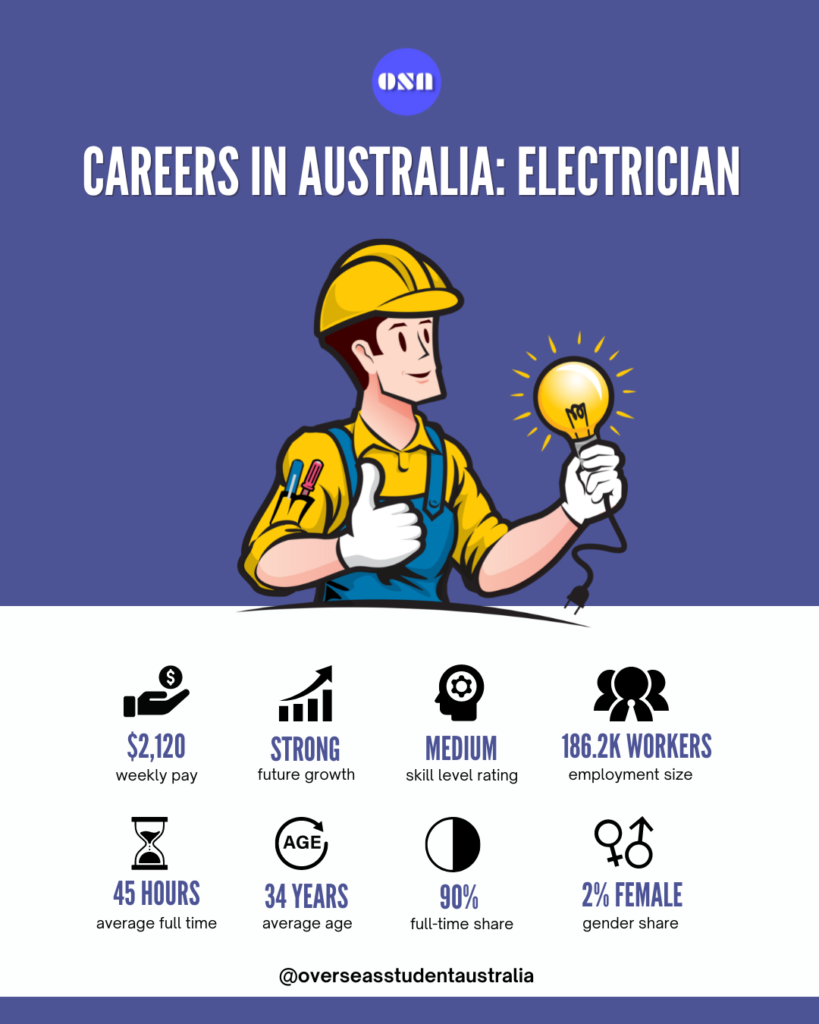How to become an Electrician in Australia with a Salary Guide

Are you great at problem-solving? Do you love calculative adventures that involve maths, physics and technical skills?
If your answer to these questions is Yes, then you are in the right place!
In this blog, you will discover all the vital information you need on how to become an electrician in Australia.
Overview of the Electrical Engineering Sector
Electricians are important and in high demand in Australia.
There are over 186,000 electricians now employed in Australia, and there is still massive demand for these professionals, making this industry a sweet spot to start a career in.
Electricians build, assemble, fit, analyse, diagnose, support and repair electrical systems, circuits, equipment, parts and appliances. They work for domestic (homes), industrial (plants), and commercial (businesses) purposes.
This is a great career path for you if you are hard-working, technical and have good maths skills.
Size of the industry
There are over 186,000 electricians in Australia. Projected statistics show strong growth of 10.2% by 2026. This is clearly a reliable career path to walk in.
Popular Locations
Electricians are in high demand in different locations in Australia. Around 44% of electricians live outside capital cities. Here below is the percentage of Electricians in different areas of Australia by state and territory:
- New South Wales 29.2%
- Queensland 22.7%
- Victoria 22.1%
- South Australia 14.2%
- Western Australia 6.7%
- Tasmania 2.0%
- Australian Capital Territory 1.7%
- Northern Territory 1.3%
This is why it is vital to consider a potential career path when selecting a city to study. Click here to find out how to choose a city to study in Australia.
Industries where electricians are needed
A massive 68% of the entire electrician workforce work in the construction industry. Other industries account for the remaining 32% of electricians in Australia.
The industries include:
- Manufacturing 7%
- Mining 6.2%
- Electricity, Gas and Water and Waste services 5.6%
- Other industries 13.2%
Hours of work
In Australia, around 90% of employed Electricians work full-time hours in all their jobs. Full-time workers work an average of 45 hours per week in their primary job.
This is like the working hours average for all jobs in Australia (44 hours per week). About a third of workers regularly work overtime or extra hours (either paid or unpaid).
Age
The average age of Electricians is 34 years. This is younger than the all-jobs average of 40 years. A large share of workers (30.6%) are within the age brackets of (25 to 34) years.
Gender
With over 186,000 Electricians in Australia, women account for a drastically low 2% of the entire workforce, while men account for the remaining 98%.
This is 46% below the all-jobs average (48%) for women and 50% above the all-jobs average for men.
What are some of the skills required to become an electrician in Australia?
Here are some essential skills you must have to be an electrician in Australia:
- Critical thinking
- Electrical know-how Skills
- Building and construction
- Mechanical and technical skills
- Mathematical skills
- Customer service skills
- Physical handling skills
- Analytical skills
- Practical and administrative skills
Note that skills can be improved through training or experience.
What are the tasks and duties of an electrician in Australia?
Here are some of the tasks and duties performed by electricians:
- Diagnosing faults in electrical systems and networks using proper equipment.
- Proper installation of appliances and tactical positioning of switchboards.
- Re-wiring faulty circuits and electrical boards.
- Analysing blueprints, wiring diagrams and specifications to find methods of operation.
- Giving professional advice to clients or customers on issues relating to their electronics and electrical systems.
- Proper lightening, wiring and fixtures
How much do electricians earn in Australia?
Electricians salaries differ depending on their level of education, skill and experience in the industry.
Average full-time earnings are $2,120 per week, which is much higher than the all-job average pay ($1,593). The average hourly pay for electricians is $49, which is more than the entire job’s average pay ($41 per hour).

Essential Steps To Becoming An Electrician In Australia
To work as an electrician in Australia, you need proper training backed up with accredited licensing.
It is essential to know that before taking any course, you need to have a minimum education requirement of Year 10 or Year 12 (High School Certificate) or its equivalent.
If an international student decides to complete the below listed courses, then they must meet the Year 12 equivalent academic requirements and English test requirements (e.g.overall score of 5.5 in IELTS test).
Here is a step-by-step procedure on how to become an electrician in Australia:
Step 1: Complete a Certificate III in Electrotechnology
To become an electrician in Australia your first step is to complete a Certificate III in Electrotechnology.
A certificate III in Electrotechnology provides students with the knowledge of selecting, installing, setting up, repairing and managing electrical networks.
You are required to complete a Certificate III in Electrotechnology through a school-based apprenticeship or NECA education.
For local students, this certification accompanied by your apprenticeship would be completed within 4 years of full-time study and cost an average of $12,000 to $18,000..
For international students, this certification would be completed within 2 years of full-time study and cost an average of $10,000 to $15,000 per year.
Some students also usually undertake Certificate II in Electrotechnology to enhance the basic knowledge, but it is not a prerequisite for Certificate III in Electrotechnology.
Step 2: Complete Apprenticeship training
This step involves acquiring both on-site and off-site experience in the industry. It is necessary to complete apprenticeship training to become a qualified electrician.
You would be employed as an apprentice with an electrical employer where you would learn both practical and theoretical aspects of the occupation whilst undergoing a Certificate III in Electrotechnology course.
It takes 4 years for a full-time apprenticeship along with the completion of your Certificate III in Electrotechnology.
Important note: International students can’t undertake apprenticeships in Australia. Please speak to the school (some institutes listed below) for relevant training for this course.
As a part of the course, international students may be required to undertake practical vocational placements to learn about the practical component of the profession.
Step 3: Get A Licence
There are a series of licences and requirements that must be met before you become a licensed electrician in Australia. These licences vary from state to state. For example, to work as an electrician in Victoria you need the following certifications:
- Licensed Electrician’s Assessment (LEA)
- Licensed Electrician’s Theory (LET)
- Licensed Electrician’s Practical (LEP)
- Safe Work Practice (SWP)
Here are the requirements to become licensed electricians in Queensland and New South Wales.
What are some of the popular institutions to study electrotechnology certificates in Australia?
For domestic students, these are popular institutions for Electrotechnology courses:
- Swinburne University of Technology
- Tafe New South Wales
- Tafe Western Australia (TAFE)
- University of Technology Sydney
- Royal Melbourne Institute of Technology
- Tafe Queensland
- The University of Adelaide
For international students, there are few providers providing Electrotechnology courses including:
- Australia Superior Training Centre
- Australia Study Centre
- Ausinet
Future growth of Electrical Engineering career in Australia
Electricians are in high demand because their skills are needed in various industries like construction, mining, domestic, commercial, manufacturing, waste and water, etc.
This is a promising career path with projected strong growth for the next 5 years. Recent technology has heavily changed this industry as new specialisations are open from IT to using special tech software such as Auto CAD, Simulink, Proteus etc.
With proper training, experience and continuous learning, you will gain mastery and recognition in this industry.
And this is everything you need to know about becoming an electrician in Australia. Let us know the next career you would like us to cover in the comment section below.


